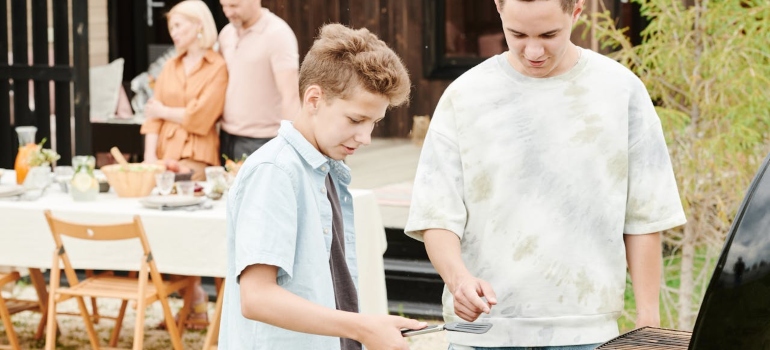Experimenting with drugs or alcohol during adolescence can lead to dangerous consequences, including addiction. Teens often face peer pressure, curiosity, and stress, making them more likely to try substances without fully understanding the risks. Unfortunately, experimenting leading to addiction is a common pattern that can have lifelong effects. While families in West Virginia have access to resources like detox centers in WV, prevention remains the most effective way to address this issue. Explore how families can prevent experimentation from escalating into addiction through communication, education, and community support.
Understanding the Risks of Experimentation
Adolescence is an important time for development and decision-making, and one of the most significant challenges many teens face is exposure to drugs and alcohol. Experimenting with substances may seem harmless at first, but it carries real dangers. What is drug experimentation, and why does it matter? Simply put, experimentation involves trying substances out of curiosity or under social pressure. While it might not immediately lead to addiction, it opens the door to behaviors that can spiral out of control. Let’s explore why this phase is particularly risky for teens.

Why Teens Are More Likely to Experiment?
Teens are naturally curious and often seek independence during adolescence. These traits, combined with their developing brains, make them more prone to risky decisions, including trying substances. Common factors driving this behavior include:
- Peer pressure: Friends or social groups often encourage teens to try alcohol, marijuana, or other substances. Feeling left out or wanting to fit in can push them to participate.
- Stress and anxiety: Academic pressures, social struggles, or family problems can lead teens to seek unhealthy coping mechanisms.
- Curiosity: Teens may simply want to know what using a substance feels like, not understanding why experimenting with drugs is risky or the potential for addiction.
- Media influence: Television shows, movies, and social media sometimes glamorize drug and alcohol use, sending mixed messages about their safety.
How Experimenting Can Lead to Addiction
The question “Can experimentation turn into addiction?” is necessary for parents to address. The answer is a resounding yes. Experimenting during the teen years is particularly dangerous because their brains are still developing. Substances like alcohol, stimulants, or opioids can interfere with brain development, affecting judgment, impulse control, and emotional regulation.
Studies show that the earlier a person begins using substances, the greater the risk of long-term addiction. For example:
- Repeated use becomes habitual: What starts as occasional use—trying substances at a party—can turn into regular use, especially if the teen begins to rely on substances for stress relief or social confidence.
- Tolerance and dependency develop: Over time, teens may require larger amounts of a substance to feel the same effects. This tolerance increases the likelihood of dependency, making addiction a real possibility.
The Difference Between Experimentation and Addiction
It’s necessary to distinguish between the difference between experimentation and addiction to intervene early. Experimentation is typically infrequent and situational, such as trying alcohol at a friend’s gathering. Addiction, however, is characterized by compulsive use and an inability to stop despite negative consequences. Recognizing this progression can help families act before a teen crosses the line into addiction.
Prevention Strategies for Teens and Families
Preventing addiction starts at home. Families can take proactive steps to reduce risks. Open and consistent communication about the dangers of substance use helps teens make informed decisions. Parents should also model healthy behaviors, as teens are likelier to follow positive examples. Fostering a supportive and structured environment can discourage experimenting and promote long-term well-being.

Open Communication
Talk to your teen regularly. Honest conversations about substance use can help them understand the risks. Avoid judgmental language. Instead, ask questions like:
- “Why do you think some people choose to experiment with drugs?”
- “What do you know about the dangers of drug experimentation?”
Education
Teens need accurate information. Share facts about the effects of drug experimentation, such as how substances like alcohol or stimulants can impair judgment or harm mental health. Highlight real-life examples of how experimenting leading to addiction has impacted others to make the risks more relatable. Encourage teens to ask questions and discuss what they’ve heard from peers or media to clarify misconceptions. Schools and communities often offer programs to help, including workshops that explain the long-term consequences of substance use clearly and engagingly.
Setting Boundaries
Establish clear rules around substance use. For example:
- No alcohol at home, even during family gatherings.
- Curfews to limit exposure to risky situations.
- Consequences for breaking rules.
Building Protective Factors
Protective factors reduce the likelihood of addiction. These strategies help teens build resilience and make healthier choices:
- Strong family relationships: Teens with supportive families are less likely to turn to substances. Spend time together, whether it’s through shared meals, family outings, or simply checking in daily.
- Quality free time: Encourage your teen to participate in activities and hobbies that support sobriety, such as joining sports teams, clubs, or creative pursuits.
- Fostering self-esteem: Help your teen feel confident in their abilities. Praise their accomplishments and teach them decision-making skills. Teens who feel empowered are less likely to give in to peer pressure.

Recognizing Warning Signs in Teens
Parents often ask, “Is experimenting with drugs normal?” While curiosity is common during adolescence, some behaviors may signal a deeper problem. Recognizing early signs of substance use or experimentation is crucial to preventing experimenting leading to addiction. Catching these warning signs early gives families the opportunity to intervene before the situation worsens.
Common Warning Signs
Certain changes in behavior, appearance, or habits may indicate a teen is experimenting with drugs or alcohol. Here are some key signs to watch for:
- Mood changes: Unexplained irritability, sadness, anxiety, or anger can signal that something is wrong. While mood swings can be normal in teens, sudden or extreme changes are worth addressing.
- Shifts in friend groups: If your teen starts spending time with a completely new group of friends, particularly those who display risky behaviors, it could indicate that they’re being influenced to try substances.
- Declining school performance: A drop in grades, missed assignments, frequent absences, or complaints from teachers may point to distraction or substance use.
- Physical signs: Look for bloodshot eyes, unusual smells on clothing, sudden weight loss, or a lack of attention to personal hygiene.
Other signs may include secrecy, lying about their whereabouts, or losing interest in activities they once enjoyed. While these behaviors don’t confirm substance use, they signal the need for an open conversation.
Why Early Intervention Matters
Understanding the dangers of drug experimentation and acting quickly is very important. Ignoring warning signs can allow substance use to escalate, increasing the risk of dependency and addiction. For example, what starts as casual use of alcohol or marijuana can lead to experimenting with harder substances like opioids or stimulants. Teens struggling with substance use may need professional help, such as stimulants rehab or other specialized treatments.

When you notice these behaviors, approach your teen with empathy and curiosity rather than judgment. Ask open-ended questions, like:
- “I’ve noticed you seem upset lately. Can you tell me what’s going on?”
- “You’ve been spending a lot of time with new friends. What do you like about them?”
By showing concern without blame, you create a space for your teen to open up about their struggles. If their behavior doesn’t improve, consider reaching out to a professional for guidance. Early intervention through counseling or education programs can help prevent long-term addiction issues.
How to Seek Professional Help
Sometimes, family efforts aren’t enough. Reaching out to experts can make a significant difference. West Virginia offers resources like fentanyl detox treatment and family-focused programs to address teen substance use. These services provide specialized care tailored to the unique needs of adolescents, offering them the tools to break free from substance use. Professional help also gives families the guidance and support they need to navigate this challenging time together.
Benefits of Professional Help
- Evidence-Based Therapies: Therapies like cognitive behavioral therapy (CBT) help teens understand the consequences of their actions. Family counseling builds communication and trust.
- Holistic Therapy: Programs like Holistic therapy for addiction focus on mental, emotional, and physical health. They may include yoga, art therapy, or mindfulness exercises.
- Detox and Rehabilitation Services: Facilities like a rehab center Marietta OH offer specialized programs for teens. These centers provide a safe environment for recovery and teach coping skills for long-term sobriety.
Addressing the Question: How Can You Avoid Becoming Addicted to Something?
Avoiding addiction requires informed choices and proactive strategies. Teens need to understand that addiction doesn’t happen overnight—it often starts with seemingly harmless experimentation. Encouraging them to recognize triggers, avoid risky environments, and seek healthy coping mechanisms can make a big difference.
Parents and educators should help teens develop a strong sense of self-worth and resilience. Activities like journaling, exercise, or creative pursuits can offer positive outlets for stress and emotions. Additionally, open conversations about the risks of addiction and regular check-ins provide teens with a safe space to express concerns or seek advice.

Professional programs also offer preventive education and counseling to help teens stay on track. For example, the alcohol rehab Cambridge OH families rely on provides life skills training to help teens build a substance-free future.
The Role of Education and Community Support
Preventing experimenting leading to addiction requires a united effort from families, schools, and communities. Education and accessible resources can help teens make better decisions while creating a supportive environment that discourages risky behaviors.
Why Education Matters
Education gives teens the knowledge they need to make informed choices. School programs can teach what are the effects of drug experimentation, focusing on the consequences of even casual substance use. Practical lessons, such as understanding how substances affect mental and physical health, help teens grasp the risks. To make the message more impactful:
- Share real-life stories of individuals who faced addiction after experimenting with substances. These examples help teens see why is experimenting with drugs risky.
- Use peer education programs to encourage open discussions among teens. Hearing from others their age makes the information more relatable and easier to accept.
- Provide strategies for handling peer pressure, such as confidently saying no or walking away from risky situations.
How Communities Can Help
Communities can provide important resources to prevent substance use. Offering safe spaces, such as youth centers or after-school programs, keeps teens engaged in positive activities and away from high-risk environments. These programs often encourage participation in healthy outlets, such as sports or creative arts. To enhance support:
- Host public awareness campaigns that educate both teens and families about the risks of drug experimentation.
- Share information about services covered by Blue Cross Blue Shield drug rehab coverage, ensuring families know where to find affordable help if needed.
- Organize community workshops where teens and parents can learn prevention strategies and ask questions in a supportive setting.
Collaboration Is Key
Preventing addiction requires consistent teamwork. Schools, parents, and addiction specialists must collaborate to provide clear and unified messages about the risks of drug experimentation. Teachers can integrate discussions about substance use into health classes, while counselors and parents reinforce these lessons at home.

Communities that work together to promote awareness, education, and resources create safer environments for teens. Families and communities empower teens to avoid risky behaviors and focus on healthier, more productive paths by offering support and positive alternatives.
Preventing Experimenting Leading to Addiction: A Shared Responsibility
Experimenting leading to addiction is a serious concern for teens and families. Early intervention, open communication, and strong community support can prevent substance use from escalating. Whether it’s fostering protective factors at home or seeking professional help, families have the tools to guide their teens toward a healthy future. For those in West Virginia, resources like Harmony Ridge Recovery Center WV offer hope and support. Prevention starts today—let’s work together to keep teens safe.



